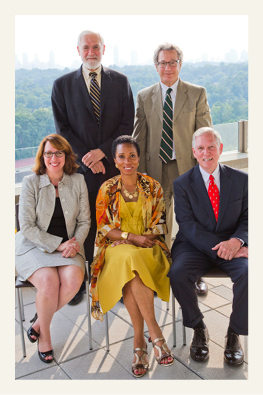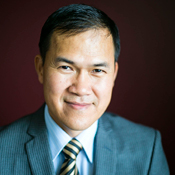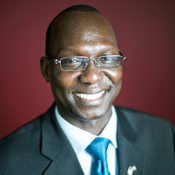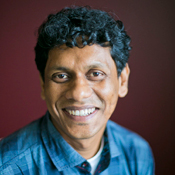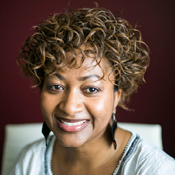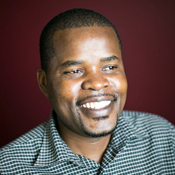Generating Social DNA
By Pam Auchmutey

The Foege Fellows during their 10th anniversary reunion, their first meeting as a group.
|
|
Ayman El Sheikh's impact on health changed dramatically after studying at Rollins. Before he enrolled, he worked as an electronics engineer with IBM and as an IT manager for Save the Children in Sudan. After graduating from the RSPH, El Sheikh returned to his homeland, where he helped the Carter Center set up a database to better track progress toward guinea worm eradication and secured a $15.8 million grant from the Global Fund to Fight AIDS, Tuberculosis, and Malaria to strengthen the nation's TB program. He now works in Namibia to ensure that 300,000 schoolchildren are receiving proper nutrition through the United Nations World Food Program.
El Sheikh 05MPH is among the first students to benefit from the William H. Foege Fellowships in Global Health at Rollins. Now in its 10th year, the program has enabled 24 mid-career professionals from 22 countries to become more effective leaders in global health. For the first time this fall, 21 alumni and current fellows met at Rollins to share their successes and challenges during their 10th anniversary reunion. Deborah McFarland, director of the Foege Fellows Program, has mentored all of the fellows since the initiative began in 2003.
"You are the ones on the frontlines of public health," McFarland told the fellows. "We want you to use this meeting time to share the skills, philosophy, and values that drive the health decisions you make to enhance training for future generations of Foege Fellows."
Her comments echoed the sentiments of Bill Foege, the smallpox eradication pioneer and former CDC director for whom the fellowships are named. A decade ago, Melinda Gates was instrumental in creating the Foege fellowships by providing an endowment through the Bill & Melinda Gates Foundation, where Foege serves as a senior fellow. In 2012, the foundation provided another grant to increase the number of fellowships and sponsor a workshop.
"Through the centuries, there have always been shining lights—people who keep us on the right path in this complex world," said Foege, Presidential Distinguished Professor Emeritus of International Health at Rollins. "It's gratifying to see how you have changed lives and how people treat one another."
|
|
|
|
|
|
|
|
|
|
Also attending the workshop were top leaders from the CDC, the Carter Center, the Task Force for Global Health, CARE USA, and Emory, which nominate fellows for the program each year.
"A lot of what happens in public health happens because of the passion of a few people," said Patricia Simone, deputy director of the Center for Global Health at the CDC. "The Foege Fellows are part of that. You are changing the culture to address public health problems in a scientific way."
As the fellows well know, improving health in underserved countries is not an easy road. Sadi Moussa 05MPH, who comes from Niger and now serves in Mali, has worked with 18 different ministers of health in 20 years. Herty Herjati 12MPH manages efforts to eliminate lymphatic filariasis and control helminthiasis in Indonesia, where people often resist taking prophylactic drugs when they have no visible symptoms of disease. Martin Swaka 05MPH of South Sudan is pushing to rebuild an effective health system following years of civil war. In the process, he has learned the value of engaging government and nongovernmental partners in creating a strategic development plan to achieve common goals. Such a plan, Swaka said, "allows us to stay focused on the noble public health goal of reducing morbidity and mortality."
Other workshop participants changed career paths after completing their fellowships. Rose Wanjala 11MPH, once a laboratory scientist in Kenya, now coordinates a multi-site study there to determine the economic and health benefits of sweet potatoes for mothers and young children. Gilbert Boredison 11MPH transitioned to the private sector to advocate for health and community development with the largest mining company in Madagascar. He oversees a $24 million investment in projects to improve health, education, and the livelihoods of people who live along the company's pipeline route.
After graduating from Rollins, Senkham Boutdara 08MPH planned to resume his career with CARE in Lao PDR. He opted instead to become the senior policy officer with the Western Australia Department of Health, where he is the first senior-level person to address the health of Aborigines in the region.
Boutdara often uses what he learned at Rollins to guide the region's 43,000 health system workers in implementation of the 2011 National Health Reform Agreement. A primary goal of the law is to close the gap in health disparities in partnership with Aboriginal leaders and communities.
"To improve health, we have to learn more about Aboriginal people and involve them in helping us make better policy decisions," Boutdara said.
Building capacity
Adrina Mwansambo 12MPH is a physician in Malawi, where the nation's first case of AIDS was confirmed in 1985. When her brother died of AIDS in 1998, the drugs that could save him were unavailable in their country.
"I couldn't save my brother's life, but at least I could do something to make drugs accessible to other people," Mwansambo said. In 2001, she joined the National AIDS Commission, a newly restructured government program to address the health and social aspects of HIV/AIDS in Malawi. During the past 10 years, the commission has increased dramatically the numbers of HIV testing sites, people on antiretroviral therapy (ART), and women in programs to prevent disease transmission from mother to child.
In the course of her work, Mwansambo has formed networks to achieve common goals. She returned to Rollins to build more by connecting with other Foege Fellows. "This is continuous capacity building for us," she said of the workshop.
Like Mwansambo, Victor Akelo 14MPH has lost family members to AIDS. In Kenya, Akelo was a coinvestigator on HPTN 052, the groundbreaking clinical study which showed that ART dramatically reduces HIV transmission in heterosexual couples. When the successful results of the still ongoing study were first announced in 2011, Akelo faced his own "baptism by fire" in explaining the results to media and others outside the scientific community.
When he completes his MPH degree next year, he will be more versed in communicating science to others. "I've gained added value from my courses by learning to translate science in ways that policy-makers and villagers can understand," Akelo said.
New Foege Fellow Shahed Rahman 15MPH arrived at Rollins this fall in search of the same skills and more. Rahman, who serves as the national nutrition coordinator of maternal and child health for CARE Bangladesh, wants to expand his ability to work in a more systematic way.
"I want to learn how to better navigate and improve health systems," he said. "My dream is to influence people and policies and translate knowledge more effectively for mass populations to protect their health."
Next steps
At the end of the workshop, McFarland asked the fellows to suggest ways to strengthen the fellowship program. They offered numerous ideas: Continuing education through distance learning. Adding courses in management and leadership to the fellowship. Serving as mentors to incoming fellows. Launching a collaborative research project. Connecting more with mentors at the CDC and other agencies. Helping fellows re-enter the workforce. And more.
As alumni fellows prepared to return home and current fellows began their RSPH classes, they did so armed with the support and advice of leaders from their nominating agencies. Helene Gayle, president and CEO of CARE USA, encouraged the fellows to spread their "social DNA"—a term often used by Bill Foege—throughout the world.
"How do we use our experience to address poverty, malaria, or polio?" she asked. "Each of us has a responsibility to use what we know and take it to the next level. It's like a relay race—taking the baton and moving forward. I find hope and inspiration from being here with you."
THE DEBORAH A. MCFARLAND GLOBAL FIELD EXPERIENCE FUNDThe Deborah A. McFarland Global Field Experience Fund has been established by the generosity of an anonymous donor to honor her lifelong commitment to global health education. Gifts to the fund will support global field experiences, enabling students to conduct summer research worldwide. The donor has pledged to match gifts made before December 31, 2013. Gifts to date include generous support from the Foege Fellows honoring their mentor. To learn more or make a gift, please contact Kathryn Graves, associate dean for development and external relations, at 404-727-3352 or kgraves@emory.edu |

